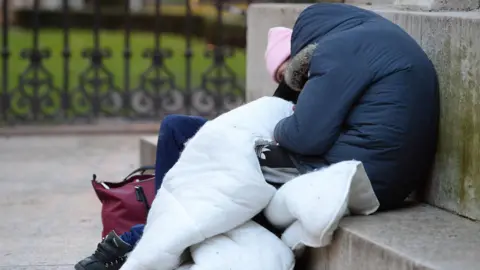In a major shift in policy, the UK government has announced plans to decriminalize rough sleeping in England and Wales, officially abolishing the 200-year-old Vagrancy Act. This historic announcement signifies a crucial step towards addressing homelessness and the treatment of those affected by it. The decision to repeal the act, initially introduced in 1824, comes amid growing recognition that the law is both cruel and outdated.
Deputy Prime Minister Angela Rayner has been vocal in her support for this move, describing it as a necessary correction to what she termed “nearly two centuries of injustice towards some of the most vulnerable in society.” This sentiment echoes a broader societal consensus that criminalizing homelessness is not a viable solution to the rising issue of rough sleeping. Rayner emphasized, “No one should ever be criminalised simply for sleeping rough.” The government aims to replace the Vagrancy Act with targeted legislative measures focused on dealing with associated crimes, such as organized begging and another form of trespassing, while ensuring that the vulnerable populations are treated humanely and with dignity.
Recent statistics reveal a significant decline in prosecutions under the Vagrancy Act, indicating a gradual shift in public and governmental attitudes towards homelessness. In 2023, there were only 79 prosecutions for offenses related to rough sleeping, a stark drop from figures recorded a decade ago when prosecutions peaked at over a thousand. This downward trend reflects a growing awareness of homelessness as a societal challenge rather than a criminal issue, and the government is now positioning itself to reinforce that perspective through legislative change.
The plan to scrap the Vagrancy Act was initially proposed in 2022 by the previous Conservative government, but the transitional process stalled, delayed by the calling of a general election. The Labour government, now in power, is keen on moving forward quickly with this legislative reform.
As part of this effort, new amendments to the existing Crime and Policing Bill will introduce specific offenses aimed at hindering organized begging and addressing certain forms of trespassing linked to criminal activity. While the aim is to maintain community safety, officials assure that their approach will not lead to the criminalization of individuals merely seeking refuge from the streets.
Homelessness organizations have heralded the government’s decision as a transformative moment. Matt Downie, chief executive of Crisis, a prominent charity focused on homelessness, lauded the move as one that could dramatically improve lives—preventing many from being forced into isolation and danger. Downie’s positive reception of the government’s stance highlights the potential for a more supportive framework for individuals facing homelessness, advocating for solutions that empower these individuals to reclaim their lives.
The context of rising homelessness in urban centers, particularly in London, with reports indicating a 26% increase in rough sleeping, adds urgency to this policy shift. The decision to indicate a clear alternative to punitive measures represents a significant departure from past practices, illustrating a commitment to reshaping the narrative around homelessness from one of criminalization to one of compassion and support.
In conclusion, the UK government’s recent decision to decriminalize rough sleeping marks a pivotal change in policy that seeks to address homelessness through mean more constructive and humane means. It underscores a growing recognition that effective long-term solutions to homelessness require understanding, compassion, and an unwavering commitment to change societal perceptions and legislative practices associated with vulnerable populations. The repeal of the Vagrancy Act stands as a hopeful sign for those advocating for an end to homelessness, aiming to create a system that instead supports individuals in need.



